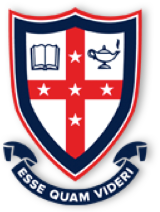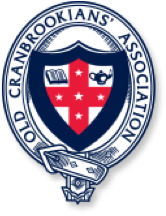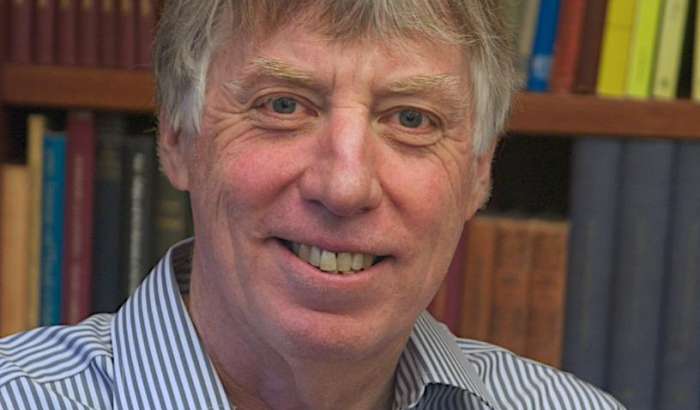Professor Richard Hunter (OC 1970), Regius Professor of Greek
This extended interview was conducted by Christopher Cunio (OC 2015) for the Old Cranbrookians' Association and first appeared in the OCA Newsletter, March/April 2017.
At Cranbrook Richard Hunter, Old Cranbrookian of the Year for 2017, had an outstanding record of achievement, being the Head of Fourth, Fifth and Sixth Form, Head of Davidson House and Captain of Cricket. Beyond school, Richard’s interests have been Greek literature and its reception in Rome, ancient literary criticism, and the intersection of philosophical and literary traditions in antiquity. He currently holds the title of Regius Professor of Greek at the University of Cambridge, one of the world's most prestigious professorships in the classics.
What year did you start at Cranbrook and what are your best memories of school?
Cranbrook was the only school I ever attended. I suppose that I must have started at St Michael's kindergarten in 1956/7 (I did not burn it down, but somebody did ... ); I also have very happy memories (or perhaps constructed memories) of the Prep School in Kent Road.
Do you feel that your education at Cranbrook influenced your choice of career? If so, how? If not, how did you become interested in the ancient world?
Cranbrook was absolutely central to my career. In those days everyone did two years of Latin (in the last year of the Junior School and the first year of the Senior School); after that you chose (or someone chose for you) between Latin and geography (obviously a choice fraught with symbolic meaning in a country like Australia). In my second year of Latin the idea arose that I should learn Greek – I suppose I seemed an unusually good little nerd at Latin declensions, and Greek and Latin were always thought of together. Cranbrook had not taught Greek formally for nearly 50 years, but Tony Brough insisted and not long thereafter Graham Burnet was hired and, with the support of Mark Bishop, the timetable was constructed so that Greek could be a part of it. I guess Greek just proved to be my thing. I was incredibly lucky to have teachers like Harry Nicolson who taught me a very great deal just by their example.
What was the journey you undertook from leaving school to becoming a professor at Cambridge today? What were the difficulties you faced?
I studied Greek and Latin at the University of Sydney (after a desultory toying with law in my first year) and then went to do a doctorate at Cambridge, without (as I now realise) giving much thought to what I wanted to do afterwards. The journey itself was fun, as I travelled to England in 1975 with the first OCA cricket tour of England. Fairly soon after starting at Cambridge I realised that I wanted to be an academic, and that is what happened. I guess I worked hard and got lucky – you need luck. I don't think I faced many real difficulties – I was very happy in Cambridge and with what I was doing from Day 1 and I still am.
What is it that interests you about the world of ancient Greece and Rome?
Where do I start? I find the literature, culture and philosophy of the ancient world endlessly enthralling, and the contribution which study of the ancient world has made to the whole shape of humanities research in the modern world is extraordinary. There is also a very personal aspect to this. Ancient literature has been with me (and with many of my closest colleagues) now for so long that it is the single resource that I find most sustaining. This literature travels with me; I carry it around; and the more often one returns to it, the more sustaining it becomes.
I notice that you are an editor and author of many publications – what entices you to continue to take on that role?
Research is one of the two most important parts of what I do – the other is teaching, but it is also important that these are overlapping, not quite separate worlds. I have always thought that if I did not feel that I was a productive and innovative researcher, then I should go and do something else. Fortunately, that day has not yet arrived. Plato compared one's publications to one's children (well, he almost did): there is something in that – you love them all, but some more than others.
What does your role as President of the Council of Aristotle University of Thessaloniki entail?
My term as President in fact finished in September 2016. It is a very long, and not always happy story. The previous Greek administration introduced Councils (essentially a kind of board of trustees) for all Greek universities, which had never before had any kind of oversight body; the Councils contained both internal and external members. We had wide powers of oversight over academic policy and budgetary matters, but were hampered by deep opposition within the universities and within the relevant ministries; no one likes to see their monopoly of power threatened or questioned. It was a very, very difficult time for Greek universities – the financial crisis saw to that – and the Councils tried to help as best we might. To my great sadness, the current Greek government has all but ended the experiment with the Councils. People tell me I should write a novel about my experiences – they could not be memoirs, as no one would believe them ...
What, for you, is the most lasting influence of ancient Greek and Roman literature on subsequent Western literature generally?
As I said before, where do I start ... virtually all Western literally forms trace their origins back to antiquity ... one thing that never goes away, however, is the concern with the place of the individual in a complex society: whether it be Achilles and Odysseus in Homer or Socrates in Plato, "How should one live?" is what ancient literature taught us is the biggest question of them all.
Congratulations on being elected as a Fellow of the British Academy; what were your thoughts upon receiving this distinction?
I guess my principal thought was how much pleasure my parents would have taken in this had they still been alive.
Similarly, what does it mean to you to be the Regius Professor of Greek, the most prestigious position of its kind (along with the corresponding position at Oxford) in the world?
Well, there are many strands to this. I am very proud to hold this Professorship and very conscious of the company I keep by holding it. I have been incredibly lucky in my career, and one of the greatest pleasures about my position is that I am part of what I (and many others) regard as the best place in the world to study classics. I hope that I am also conscious of the responsibility to the health of my subject, both within and outside Cambridge, that comes with the position, and I have worked hard to keep Greek at Cambridge in the forefront of research and teaching in the subject. I feel a particular responsibility not just to promote the learning of ancient Greek and ancient Greek culture but also to foster the careers of younger colleagues throughout the world.
In your inaugural lecture on becoming Regius Professor of Greek in 2001, you remarked that "[t]his is ... not the easiest period for Greek and for Classics as a whole". Do you think anything has changed in the intervening 16 years?
Well, things have to some extent got even tougher, in terms of making sure that schools are willing to teach ancient languages even to small classes. On the other hand, general interest in the ancient world has never been higher – in the UK there is always some new TV program (usually involving one of my current or former colleagues) about some aspect of Greece and Rome. It is our job to harness that interest towards the serious study of antiquity.
What have you observed to be the most important developments in the scholarship on ancient Greek and Roman literature since you started teaching in 1977?
Put simply, the study of classical literature has always been important in shaping the direction of humanities research more broadly, and this certainly remains true today. I suppose, however, that the way in which classics has taken the lead in different modes of reading strikes me now more forcibly than ever – classics has been a very fertile ground for such influential critical movements as structuralism, feminism, and new historicism, and it is now leading the way in, for example, cognitive approaches to literature. This is one of the things which keeps the subject constantly alive and constantly new. So too, the fact that studying 'literature' is now complete enmeshed with, for example, ancient philosophy and art is also all to the good; 40 years ago these things were kept much more separate.
What advice would you give to someone who has similar interests in setting up a career overseas and when you come to the school later in the year, what advice do you plan to give current students?
Academic careers are built on intelligence, hard work and genuine enthusiasm. Anyone who wants to follow the academic path needs both to seek good advice and really love what they are doing; it should be, as it still is for me, a consuming passion.
You said that after the two years of Latin "...you chose (or someone chose for you)", seeing as you also stated that your parents would have been filled with pleasure with your election as Fellow of the British Academy, it makes one wonder: To what extent was your choice of career inspired or supported by your parents?
Not exactly 'inspired' (there is really no other academic in my family), but my parents were always very supportive of (nearly) everything I did. I think, to be honest, that they wanted me to be a lawyer, as so many Sydney parents at that time did (perhaps still do, for all I know), but once it was clear that my course was set in a different direction, they supported as far as one can from 12,000 miles away.
You mentioned that you travelled to England in 1975 with the first OCA cricket tour of England. Do you still participate in any sport or do you still follow cricket either as an Australian or England supporter?
Well, I have never ever been an 'England supporter' in any sporting activity ... very far from it ... I continued to play cricket for perhaps the first 10 years or so I was in England, and still occasionally play in my dreams (where I do rather well). There was also squash for many years: one of my regular Cambridge partners was Michael Bishop (Mark's son), who died far too young after a very distinguished career teaching at Sydney Grammar School. Now I run every day, keep an eye on the football (soccer) results and follow Australian cricket and rugby whenever they seem to get interesting.


